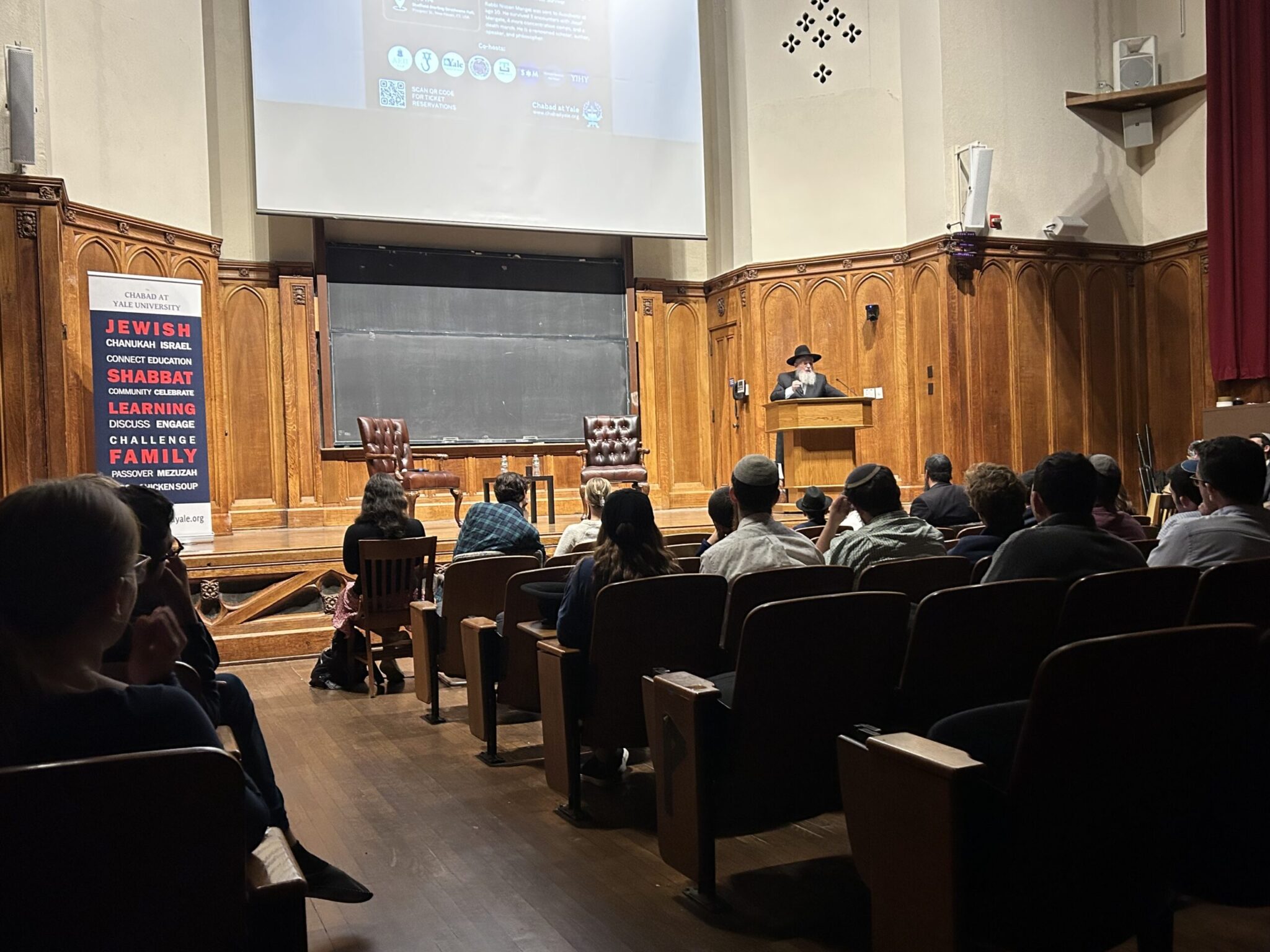Rabbi who survived Auschwitz tells story of faith amid suffering
Rabbi Nissen Mangel recounted his experience of surviving the Holocaust at a Wednesday night event organized by Chabad at Yale.

Ethan Wolin, Contributing Photographer
Rabbi Nissen Mangel, a noted Jewish scholar who was sent to Auschwitz and four other Nazi extermination camps as a child, told an audience at Yale on Wednesday evening that his improbable survival redoubled his faith in the wake of the Holocaust.
The 89-year-old rabbi, his face framed by a black hat and a long gray beard, recounted his story and answered questions during a two-hour event organized by Chabad at Yale and promoted by eight other campus organizations. Attendees mostly filled the main auditorium in Sheffield-Sterling-Strathcona Hall.
Mangel began by recalling a time when, as he was rushing to return home to Brooklyn for Shabbat, a clothing vendor in Manhattan questioned how anyone could still devote oneself to God after the atrocities of the Holocaust.
In response, Mangel pulled back his shirt to reveal to the man his identifying tattoo from Auschwitz, which he showed the audience as well.
“I still believe,” Mangel declared. “I still believe in God. I still believe in miracles.”
Astonished, the vendor “became white as my shirt,” Mangel said.
The rabbi narrated his journey through the Holocaust, from the Nazi SS soldiers’ raid of his house to an excruciating death march to Germany during which one SS member offered his cap and coffee as support.
Mangel repeatedly likened his survival against all odds to a long string of dice rolls with the same outcome.
“You roll the dice; you always get number six? Something’s going on,” he said. “Maybe something unnatural, a divine hand, intervened to save this little, little boy.”
Born in Bratislava, the capital of present-day Slovakia, Mangel was 10 when the Nazis deported his family to the Auschwitz concentration camp in Poland. Josef Mengele, the infamous Nazi doctor sometimes called the “Angel of Death” due to his experiments with prisoners, let Mangel avoid the gas chambers and go to work instead after the latter implausibly claimed to be 17.
Later, when Mangel ended up in an Auschwitz hospital with scarlet fever, Mengele proposed using him for a potentially lethal test. Mangel said he protested, “Experiment on monkeys, not on me.”
That his plea succeeded was one of several turns in Mangel’s story that he attributed, explicitly or implicitly, to God.
Once the attendees had arrived Wednesday, Mangel entered the auditorium with his wife and other relatives. The audience gave Mangel standing ovations before he spoke and at the end of the event.
Mangel strained to make out audience questions but answered with lucid — sometimes loquacious — stories. On Passover at Auschwitz, Mangel recalled, Jewish prisoners of varying religiosity risked being shot to join in singing customary songs.
“Not one person stood up in protest to say, ‘Don’t do it,’” he said.
After the war, Mangel returned home. He would eventually study at a yeshiva, or Jewish seminary, in Canada, then at McGill University and elsewhere. He has spent most of his life in New York, gaining renown as a rabbi at a Brooklyn synagogue, as a Jewish philosopher and as the translator of widely used prayer books.
The effort to host Mangel for an event at Yale began last fall, when a group of students met him as he visited his daughter in New Haven for the festival of Sukkot, according to Rabbi Meir Posner of Yale Chabad.
It was important for students to hear from Mangel now, Posner told the News, because “hate is far from extinct.”
Posner said that antisemitism specifically is the oldest type of hate — “one that is rearing its head once again.” He cited an antisemitic intrusion at the University of Pennsylvania Hillel building last week.
In an interview after Mangel’s talk, audience member Etan Basser ’24 said that he made a point to prioritize the event over his schoolwork.
“The time that you get to experience encountering the firsthand testimony of a Holocaust survivor is incredibly precious and should not be wasted or taken lightly,” Basser said.
Mangel was the second Holocaust survivor to speak on campus in a week, after the new Moderate Party hosted Sami Steigmann for an event on Thursday, Sept. 21.
When asked on Wednesday what he would tell future generations that cannot hear directly from a survivor of the Holocaust, Mangel offered two messages: that, despite numerous oppressors over the course of millennia, “am Yisrael chai” — the people of Israel live. And that, with God present, a person never walks alone.Researchers have estimated that approximately 16,000 Holocaust survivors will remain living in the United States by 2030.







